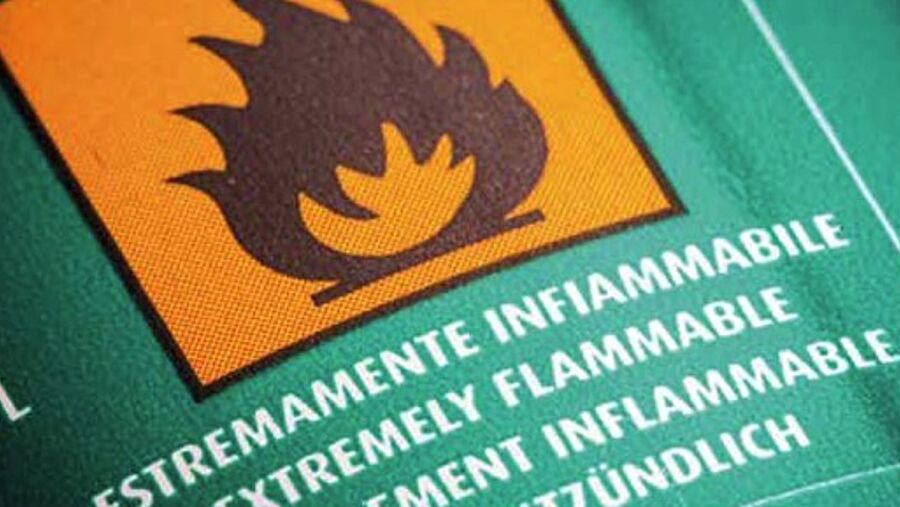
* Pantaenius UK Limited is authorised and regulated by the Financial Conduct Authority (Authorised No.308688)
As your skipper or charter insurances contracts have been concluded in Germany, you will first be redirected to the website of Pantaenius GmbH, Germany. Please follow the link-button to log in to your account.
Login Skipper & ChartererWhether acetone, nitro diluent or two-component putty: owners are bound to use flammable materials in winter storage. The Pantaenius experts explain how to handle delicate substances responsibly and where they can be stored safely.

Pictures of burnt down winter storage halls and melted boat hulls, as they appear again and again after hall fires, send a shiver down the backs of every boat owner. Because with the beloved yacht not only financial, but also emotional values go up in flames, which cannot be replaced by any money.
It goes without saying that everything should be done in winter storage to avoid fires and to prevent them from spreading after an outbreak. "Unfortunately it often looks different in practice," says Axel zu Putlitz-Lürmann, head of the yacht claims department at yacht insurer Pantaenius, "Potential fire accelerators such as gas cylinders or alcohol are by no means removed from every yacht when it is winterized. And when it comes to winter work, many owners also tend to be careless with the fire risk of cleaners, diluents, resins and paints. "Detergents and paints are not necessarily the cause of a fire," says the Pantaenius damage expert, "but they act as a dangerous fire accelerator when a fire has broken out."
Attention to the propellant liquid gas
Working with flammable cleaners and paints can be dangerous, too. Dirk Hilcken of Pantaenius reports about the owner of a nine-meter sailing yacht who wanted to clean his oily and dirty engine with brake cleaner - when a jet of flame suddenly shot at him. "In spray cans, the propellant liquid gas (butane/propane) is often used", explains Dirk Hilcken the sudden, explosive deflagration. "Although this is environmentally friendly, it is unfortunately highly flammable. When used inside the ship, liquid gas can collect and form an explosive atmosphere - sometimes just a few sprays are enough. A tiny spark can then trigger a deflagration or explosion.
Source of danger Lacquers, spatulas and cleaners
Anyone who has ever mixed two-component resins knows that this compound can develop a considerable amount of heat. "If the mixing ratio is wrong, the material can become so hot that heat damage occurs on the hull," says Dirk Hilcken. Therefore, the following applies: observe the mixing ratio carefully and adhere to it! But even after the work has been completed, spatula and resin residues must not remain on the "construction site" of the wintered-in boat, as they represent a potential fire hazard. In particular, residues of two-component paints and resins can react with each other and become sources of fire. The same applies to paint and thinner residues.
Acetone is an agent that hardly any owner can avoid in winter. The solvent evaporates rapidly and forms easily inflammable vapour-air mixtures. If acetone-soaked cleaning cloths are placed in a closed container, this mixture cannot escape; one spark is then sufficient to trigger a fire. Therefore, cloths containing acetone and other solvents should always be well ventilated before being stowed or disposed of.
How to store flammable materials correctly
Flammable liquids, also known as fire accelerators, must not be stored in the ship or anywhere else in the hall. This includes, for example, petroleum and outboard petrol as well as spirit and other liquids. But where are these liquids and the necessary materials for winter work properly stored? "Cool, dry, well ventilated, protected from sunlight and unauthorised access," summarises Pantaenius expert Axel zu Putlitz-Lürmann. A well-ventilated garage is ideal. And Dirk Hilcken suggests: "Owners can team up and organise themselves well here. In association-operated halls, for example, users can set up a room that meets these requirements. All of them have a central material store and protect their yachts and dinghies from fire damage."
Tips for fire protection in winter storage